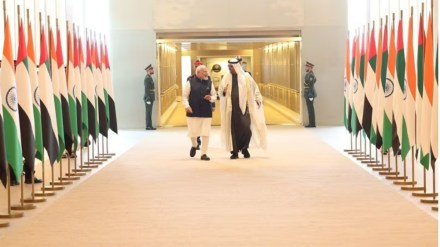By Shiv Bhagwan Saharan
On February 14, Prime Minister Narendra Modi inaugurated a major BAPS Swaminarayan temple in Abu Dhabi, a few weeks after his consecration of the Ram Temple in Ayodhya. It is a significant moment for the Hindu community in the UAE and for bilateral relationships. The BAPS temple is located in the Abu Mureikhah neighborhood and will be the first Hindu temple in the Gulf region. Additionally, the UAE has three other Hindu temples in Dubai. Spread over 27 acres with stone architecture, the BAPS temple is set to become the largest Hindu temple in the Arabian Peninsula. This is PM Modi’s seventh visit to the UAE since mid-2014 and his third in the last eight months. It seems appropriate that one of his final international trips in his second term includes visits to the UAE and Qatar.
On the inauguration of the BAPS Mandir, the Ambassador of the UAE to India, Abdulnasser Alshaali, said, “It’s going to be a phenomenal monumental day, a special occasion to celebrate tolerance and acceptance, and to strengthen this relationship further.” The persistence of confidence and collaborative work has tirelessly contributed to building India’s strong presence in the Middle East, particularly through the UAE and other regional partners, yielding favourable outcomes. During PM Modi’s first visit, the UAE decided to allocate land in Abu Dhabi to construct a temple in 2015. Notably, PM Modi’s visit held significant diplomatic importance, marking the first instance of an Indian premier setting foot in this strategically crucial Gulf nation in 34 years after the visit of Indira Gandhi in 1981.
Strengthening bilateral ties
For Indo-Emirati ties, the UAE plays a significant role as India’s fourth-largest investor, third-largest trading partner with bilateral trade of about US$85 billion in 2022-23, and second-largest export destination. This highlights the robustness of the bilateral ties and the substantial presence of the Indian diaspora in the UAE, which, at 3.5 million, is arguably the largest from a single country. It constitutes around 30 per cent of the population, contributing significantly to the local economy and sending much-needed remittances home.
The partnership between the two countries has strengthened the Comprehensive Strategic Partnership with opportunities for greater depth and breadth of cooperation. India and the UAE also signed a Comprehensive Economic Partnership Agreement (CEPA) in February 2022 and a Local Currency Settlement (LCS) System in July 2023 to promote the use of the Indian rupee and AED for cross-border transactions.
Meanwhile, PM Modi’s visit focuses on various areas, including strategic partnerships, regional security, and economic collaboration. However, the signing of key agreements, such as the Bilateral Investment Promotion and Protection Agreement (BIPPA) and the memorandum of understanding (MoU) on electrical interconnection, digital infrastructure, and trade, underscores the commitment of both nations to enhance economic cooperation and trade facilitation further. Also, the last decade has seen the expansion of counter-terror collaboration between India on the one hand and Saudi Arabia and the UAE on the other.
While the Indo-Emirati ties took another leap forward in August 2023 with the expansion of the BRICS grouping to include the key Gulf nations, setting up the I2U2 group in 2022- with India, Israel, the US, and the UAE, and the announcement of the strategically vital project India-Middle East Economic Corridor (IMEC) on the sidelines of G20 Summit in September 2023. Also, India had invited the UAE to be a special guest at the G20 summit. Thus, India’s G20 and the UAE’s COP28 presidency provided additional opportunities for strengthening bilateral relationships. These key developments keep India at the centre of things, displaying India’s diplomatic depth and soft power engagement in the Gulf region.
However, India’s soft power diplomacy has been instrumental in reinvigorating the sense of the Indian diaspora’s great pride in Indian heritage, culture, and civilisation and promoting the global resurgence of Indianness as a dharmic process that believes in universal well-being, mutual respect, and peace.
Both nations recognised the BAPS Hindu Temple as a celebration of Indo-Emirati ties and deeply-rooted cultural connections. Additionally, it signifies the UAE’s global commitment to promoting peace, harmony, tolerance, and peaceful coexistence. Moreover, to foster bilateral trade, the Abu Dhabi temple is a result of deepening strategic relations. India and the UAE are also interested in supporting peace and stability at both the regional and international levels.
The author is a Doctoral Candidate at the School of International Studies (SIS), Jawaharlal Nehru University, New Delhi. He tweets at @ShivBhagwan_JNU.
Disclaimer: Views expressed are personal and do not reflect the official position or policy of Financial Express Online. Reproducing this content without permission is prohibited.
